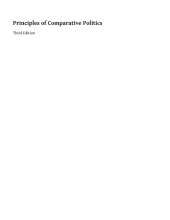The economic determinants of democracy and dictatorship - A variant of modernization theory
7 important questions on The economic determinants of democracy and dictatorship - A variant of modernization theory
One common criticism of classic modernization theory is that is lacks a strong causal mechanism and that it simply relies on an empirical correlation between income and democracy. A variant of modernization theory that helps to show why some rulers limit their extractive activity and others do not, states that:
Sovereign debt creates a credible commitment problem (or a time-inconsistency problem), thus occurs when:
b) power is in the hands of the actor who makes the promise and not in the hands of those expected to benefit from the promise.
Society has developed at least three ways to deal with credible commitment problems:
- Enforceable contracts
- Repeated interactions
- Institutions that alter the distribution of power
- Higher grades + faster learning
- Never study anything twice
- 100% sure, 100% understanding
This variant of modernization theory also provides an explanation for the political resource curse, which states that:
The political resource curse has both demand and supply side explanations:
- Demand-side explanations emphasize how resource revenues reduce both the citizen's demand for democratic reform (government won't raise taxes because they have other sources of income) and government responsiveness to that demand (government is autonomous from the citizens).
- Supply-side explanations focus on how resource revenues enable dictators to resist pressure to democratize and help them to consolidate their hold on power (easier to silence opposition with money).
Foreign aid will promote democratization only when:
- The recipient country is dependent on foreign aid
- The aid donor wants to promote democratic reform in the recipient country
- The aid donor can credibly threaten to withdraw aid if its demands for reform are not met (the extent to which aid donors can enforce their conditions for democratic reform depends on whether they have credible exit threats).
The basic argument is that inequality produces political competition between the rich and the poor. However, the variant on modernization theory states that:
The question on the page originate from the summary of the following study material:
- A unique study and practice tool
- Never study anything twice again
- Get the grades you hope for
- 100% sure, 100% understanding
































